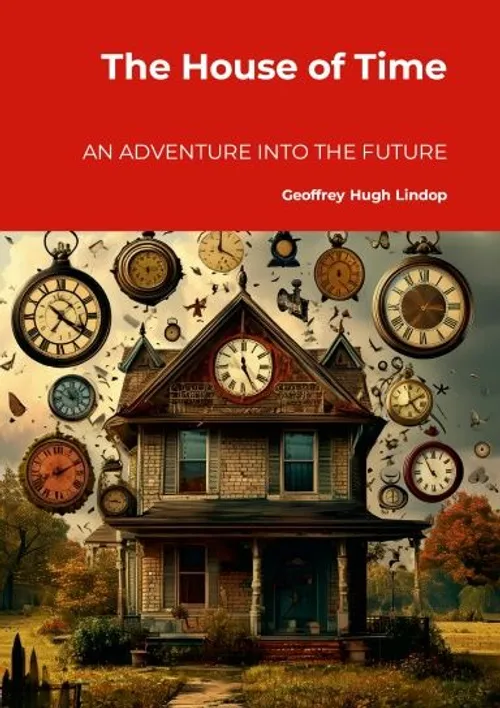Gillian had managed to buy a small dwelling on Market Drayton’s Woore Lane. It resembled a Tudor half-timbered cottage, all dark beams and white plaster, though it had only been built in recent years. The illusion proved convincing enough to satisfy her love of history—at least for now. She often caught herself imagining what it would be like to live in a real Tudor house, with creaking floorboards, smoke-stained beams, and stories soaked into the walls. That kind of property exceeded her financial capacity, but the dream persisted quietly.
Most days, Gillian spent her time either writing or researching. It was a lonely existence. In the evenings she let her hair down, taking on the job of a barmaid at the Tern Inn.
Gillian finished a chapter of her book and felt emotionally drained after spending a couple of hours glued to her keyboard. A sunny day beckoned her outside. While she walked down Shropshire Street, a group of four people examined something on the floor. It was Jonathan, one of the regulars in the pub, lying on the pavement.
“Oh God… what’s happened?” Gillian bent down to feel if Jonathan had a heartbeat.
“He just fell down?” said a bystander.
“Has anyone called an ambulance?” said Gillian.
“Yeah. One’s on its way,” a second bystander replied.
Gillian realised nobody knew what to do, so she took control. Last year, her nurse friend, Carol, taught her emergency first
aid. She put her knowledge to good effect. She took off her anorak and used it as a pillow for Jonathan, then turned him on his side. Heartbeat normal. Breathing normal.
“Yeah yeah, stand back folks, and give him some air.” She mopped the trickle of blood from his hand. It seemed ages before the emergency vehicle arrived.
***
She visited him in the hospital almost every day. He lacked relatives nearby—no one else to check in on, no one else to look after him, no one else to keep him company. When he was discharged, she continued to visit him at home to make sure he was alright. He was not.
Each morning, Gillian rose early, showered, dressed, and made the quiet journey through the still streets of Market Drayton. The dew clung to the grass, and mist sometimes hovered over Woore Lane as she stepped out, giving the town a hushed, expectant air.
Jonathan lived alone in a spacious red-brick house on a corner plot—a property that, at first glance, seemed proud and untouched by time. A symbol of a life that once boasted order and success. There was no hedge to hide it from the view of passersby, so most people in Drayton noticed it and, maybe, envied it. Yet the building turned inwards—literally—angled away from the road, so none of the windows offered a glimpse in. It was a tranquil fortress.
She walked up the long drive, her feet crunching softly on the gravel. The double garage stood to one side, oversized for a man who kept only a solitary Fiat 500, its compact frame dwarfed by the surrounding space. It was a subtle boast, a relic from an age when image mattered. The outbuilding was attached to the house by a tiny utility room that led to the kitchen. Gillian turned instead toward the front porch—open and unwelcoming in its bareness.
Jonathan was too ill to answer the bell. He had given her a key. A small, wordless gesture that carried the weight of trust—and perhaps resignation.
“Hi John. It’s just me.” She called out gently as she stepped into the hallway. The faint scent of the fuchsia on the hall table greeted her. It was sweet and surprisingly fresh in a dwelling that otherwise smelled of stale air and forgotten days.
She climbed the stairs, the bannister cool beneath her hand, the upper floor dim except for the pale spill of light from the mezzanine window. Dust caught the sunlight. It felt reminiscent of a place paused in time.
The first door on the left was the master bedroom. She found him inside, still only semi-conscious, grey-faced on a rumpled bed. She spoke to him, but he didn’t stir. Quietly, she excused herself and stepped into the bathroom next door.
‘Family bathroom’—a label that now felt like a cruel joke. No longer was the house filled with shouting children - four of them. Fifteen years of marriage had frayed down to silence, and Margaret, his wife, had finally left, taking the kids with her to Devon.
Initially, he didn’t think she would proceed. He used the dwelling as if it were a bargaining chip, a message: You’ll be back. You can’t do this on your own. But she had done it. She encountered a person who granted her independence—precisely what Jonathan had withheld for years. In the end, the court ensured he wouldn’t contact her or the children again.
Today, the house is his. Only his. The walls, once filled with chaos and life, now contained only him.
“Morning, John, How’s today treating you?”
Gillian’s voice remained light when she greeted him, even on mornings when exhaustion made her limbs ache. She supported his weight as they shuffled toward the en-suite. His steps were slow and dragging, but she never complained. She helped him onto the toilet and turned away in quiet respect. Then washed him with a soft cloth and steady, efficient hands. Back in the bedroom, she dressed him, choosing layers that preserved his dignity without sacrificing comfort.
Downstairs, the dwelling seemed cold. She aided him into the kitchen and settled him at the table. She busied herself with tea, toast, and eggs—whatever he could manage. He didn’t thank her, but she didn’t expect him to. Not anymore.
Each day after breakfast, she guided him into the lounge. He slumped into the armchair that overlooked the large brick-framed inglenook. He watched her daily ritual of kneeling on the hearth and lighting the fire. Smoke curled upward into the chimney, filling the room with the scent of wood-smoke.
On either side of the inglenook, two frosted-glass windows stood. Each evening, Jonathan insisted she switch on the standard lamps behind the windows.
“But that’s using up the Earth’s resources for no good reason, isn’t it?” Gillian said.
“It’s a signal, see. Lets ’em know I’m about. Puts off the chancers.”
Gillian could never argue with Jonathan. No one could. His refusal to see any other point of view was what finally ended his marriage.
To the left of the fireplace loomed the enormous flat-screen television. It dominated the room like a silent sentinel, too large for the area but necessary, he claimed, for comfort. He jabbed the remote with a trembling hand. The screen flickered into life with a sound too loud for the hour.
“Yeah, yeah… You alright if I pop home now, John?” Gillian said, looping her coat back over her arm. “I’ll have morning coffee with you later.”
He nodded, already distracted by the news.
She returned to her residence on Woore Lane. The peaceful cottage she once imagined would be a retreat for writing and
solitude. But her thoughts had grown tangled. She took a seat at her desk and opened her laptop. Her fingers hovered over the keys, paused, then moved sluggishly.
In two hours, she managed barely five hundred words. Her research notes were a mess, and fatigue kept breaking the flow of her arguments. Her writing—once sharp and absorbing—now felt disjointed. She had avoided certain phrases and names, afraid she might reveal too much by accident.
“I just need to tell someone…” she had almost said to Jonathan yesterday. But she didn’t. She couldn’t.
By late morning she returned to Jonathan’s, coffee mugs warming their hands in the bright kitchen. The talk was scant, but the silence didn’t faze her. Afterward, she helped him to the downstairs toilet, cleaned up, and put him back in his chair. She tended the fire again and picked up a dust cloth. She polished picture frames she was unfamiliar with and reorganised the pile of unopened mail.
Lunch included two ready meals, heated and served on warm plates. They ate in the dining room beside the kitchen. Jonathan sat at the head of the table, facing the conservatory. He liked to watch feathered friends flit through the garden. Their movements were sudden and chaotic against the quiet of the home.
She remained with her back to the wall, catching glimpses of wings and light and movement through the glass. She named the avian creatures for him—robin, thrush, blue tit—trying to give him a different preoccupation.
But in her subconscious, the guilt gnawed. Her manuscript had deteriorated. Her book—her proper work—slipped beyond her grasp. And the secret she’d carried for so long weighed heavier against her chest with every passing day.
One more slip, and she feared it would all come tumbling out.






This story has not been rated yet. Login to review this story.